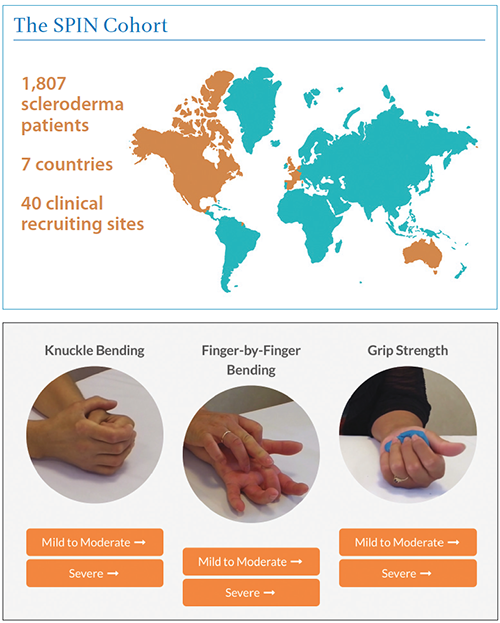Spring 2019 (Volume 29, Number 1)
The Scleroderma Patient-centred
Intervention Network (SPIN): An Innovative Cohort-Based Initiative
for Scleroderma
By Claire Fedoruk; Marie-Eve Carrier; Linda Kwakkenbos; and Brett D. Thombs
Download PDF
Scleroderma is a rare autoimmune disease characterized
by the hardening of connective tissues, which
can substantially damage the skin, blood vessels, muscles,
and internal organs. Common problems include limitations in hand function and mobility, pain, fatigue, and
emotional distress from disfiguring aspects of the disease,
among other challenges.
Although rare diseases collectively affect one in 12
Canadians, the small number of
patients at any given location is a
barrier to developing and testing
disease-specific support programs.
Thus, people with scleroderma and
other rare diseases must often cope
without the kind of support programs
that are generally available
to people with more common diseases.
To develop and rigorously test
patient programs in a rare-disease
context, SPIN maintains a cohort of
more than 1,800 scleroderma patients,
who complete quarterly online
assessments that help the SPIN
team to understand their challenges
and support needs. SPIN cohort patients
are recruited by rheumatologists
and other scleroderma health
professionals from 40 clinical centres
in seven countries.
The SPIN cohort also serves
as an infrastructure for conducting
clinical trials of SPIN’s online
support programs. Each program
addresses a problem that
scleroderma patients have identified
as important, with programs currently
in development to support:
- disease self-management;
- hand function;
- emotional coping and;
- body image distress.

SPIN’s first online program provides rehabilitation exercises to support hand function in people with scleroderma.
The first of SPIN’s online programs will be available free-of-charge
to the public in 2019. SPIN also recently pilot tested
a videoconference-based program to provide training and
resources for scleroderma peer support group leaders.
For information about getting involved with SPIN Cohort
recruitment and/or research, please consult SPIN’s
website (www.spinsclero.com) or email spin@jgh.mcgill.ca.
Claire Fedoruk
SPIN Communications and Outreach Coordinator,
Lady Davis Institute
Jewish General Hospital
Montreal, Quebec
Marie-Eve Carrier
SPIN Coordinator,
Research Associate,
Lady Davis Institute
Jewish General Hospital
Montreal, Quebec
Linda Kwakkenbos
Co-director of SPIN,
Lecturer and Researcher,
Behavioural Science Institute
Radboud University Nijmegen
Nijmegen, Netherlands
Brett D. Thombs
Director of SPIN,
Professor, Faculty of Medicine,
McGill University
Senior Investigator,
Lady Davis Institute
Jewish General Hospital
Montreal, Quebec
|




